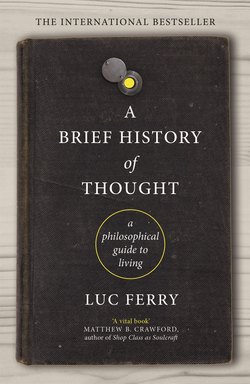Читать книгу A Brief History of Thought - Luc Ferry - Страница 10
На сайте Литреса книга снята с продажи.
The Question of Salvation
ОглавлениеThink about this word – ‘salvation’. I will show how religions have attempted to take charge of the questions it raises. Because the simplest way of starting to define philosophy is always by putting it in relation to religion.
Open any dictionary and you will see that ‘salvation’ is defined first and foremost as ‘the condition of being saved, of escaping a great danger or misfortune’. But from what ‘great danger’, from what ‘misfortune’ do religions claim to deliver us? You already know the answer: from the peril of death. Which is why all religions strive, in different ways, to promise us eternal life; to reassure us that one day we will be reunited with our loved ones – parents and friends, brothers and sisters, husbands and wives, children and grandchildren – from whom life on earth must eventually separate us.
In the Gospel According to St John, Jesus experiences the death of a dear friend, Lazarus. Like every other human being since the dawn of time, he weeps. He experiences, like you or I, the grief of separation. But unlike you or I, simple mortals, it is in Jesus’s power to raise his friend from the dead. And he does this in order to prove that, as he puts it, ‘love is stronger than death’. This fundamental message constitutes the essence of the Christian doctrine of redemption: death, for those who love and have faith in the word of Christ, is butan appearance, a rite of passage. Through love and through faith, we shall gain immortality.
Which is fortunate for us, for what do we truly desire, above all else? To be understood, to be loved, not to be alone, not to be separated from our loved ones – in short, not to die and not to have them die on us. But daily life will sooner or later disappoint every one of these desires, and, so it is, that by trusting in a God some of us seek salvation, and religion assures us that those who do so will be rewarded. And why not, for those who believe and have faith?
But for those who are not convinced, and who doubt the truth of these promises of immortality, the problem of death remains unresolved. Which is where philosophy comes in. Death is not as simple an event as it is ordinarily credited with being. It cannot merely be written off as ‘the end of life’, as the straightforward termination of our existence. To reassure themselves, certain wise men of antiquity (Epicurus for one) maintained that we must not think about death, because there are only two alternatives: either I am alive, in which case death is by definition elsewhere; or death is here and, likewise by definition, I am not here to worry about it! Why, under these conditions, would you bother yourself with such a pointless problem?
This line of reasoning, in my view, is a little too brutal to be honest. On the contrary, death has many different faces. And it is this which torments man: for only man is aware that his days are numbered, that the inevitable is not an illusion and that he must consider what to do with his brief existence. Edgar Allan Poe, in one of his most famous poems, ‘The Raven’, conveys this idea of life’s irreversibility in a sinister raven perched on a window ledge, capable only of repeating ‘Nevermore’ over and over again.
Poe is suggesting that death means everything that is unrepeatable. Death is, in the midst of life, that which will not return; that which belongs irreversibly to time past, which we have no hope of ever recovering. It can mean childhood holidays with friends, the divorce of parents, or the houses or schools we have to leave, or a thousand other examples: even if it does not always mean the disappearance of a loved one, everything that comes under the heading of ‘Nevermore’ belongs in death’s ledger.
In this sense, you can see how far death is from a mere biological ending. We encounter an infinite number of its variations, in the midst of life, and these many faces of death trouble us, even if we are not always aware of them. To live well, therefore, to live freely, capable of joy, generosity and love, we must first and foremost conquer our fear – or, more accurately, our fears of the irreversible. But here, precisely, is where religion and philosophy pull apart.
